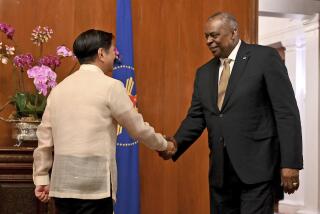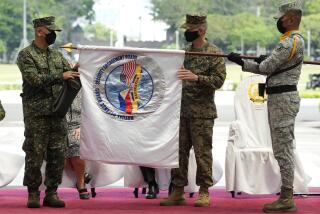Aquino Arrives for 8-Day U.S. Visit : Plans Talks With Reagan, Banks and Filipino-Americans
- Share via
WASHINGTON — President Corazon Aquino of the Philippines arrived here Monday night for an eight-day official visit that will help determine the course of Philippine-American relations for years to come.
Aquino has described the trip as historic and unprecedented and perhaps the most crucial visit by a Philippine head of state since the Philippines gained its independence from the United States four decades ago.
Clearly, the Reagan Administration also sees the trip as important. Aquino’s schedule includes a two-hour private session Wednesday morning with President Reagan, the first meeting between the two since the February coup that brought down the government of Ferdinand E. Marcos, a personal friend of Reagan’s.
Hours With Shultz
Aquino will spend several hours Wednesday evening with Secretary of State George P. Shultz, who has already forged a friendship with the Philippine president on two trips to Manila in the last six months.
The Philippine leader stressed the importance of her visit in arrival statements here and, earlier Monday, in San Francisco, but she also took pains to sound a more personal note.
At San Francisco International Airport, where she was greeted by Gov. George Deukmejian, Sen. Alan Cranston (D-Calif.), Mayor Dianne Feinstein and hundreds of cheering Filipino-Americans, Aquino said she had come to the United States “to thank the American people for their prayers and their cheers,” adding, “to tell the truth, the overriding reason I am here is because I wanted to see our friends.”
A regular commercial flight of Philippine Airlines brought Aquino to San Francisco, where she boarded Air Force Two for the trip to Washington. After arriving at Andrews Air Force Base, she was flown by helicopter to the Washington Monument, where she was greeted by Shultz.
In an effort to help solve the Philippines’ worst financial crisis since World War II, Aquino has scheduled half a dozen meetings with the directors of creditor banks in Washington and New York. The American banks, among them Chase Manhattan and Manufacturers Hanover Trust, hold the bulk of the Philippines’ $26-billion foreign debt. Aquino has said she hopes to persuade them to reschedule the loans, the interest on which consumes about half of the Philippines’ annual export earnings.
Aquino is scheduled to meet this morning with Barber Conable, president of the World Bank, and Jacques de Larosiere, director of the International Monetary Fund, which financial sources say is likely to grant final approval of a sharply increased aid package.
Half a dozen additional meetings have been set up between Aquino and members of the Filipino communities of New York, Boston and San Francisco, where Aquino hopes to inspire a flood of new private investment in her cash-poor country.
Financial experts in Aquino’s government have said the country’s biggest problem has been raising private capital to build new industries and create new jobs.
Aquino has said she appreciates the financial constraints on the U.S. foreign aid budget and does not expect Congress to approve any new aid during her trip, although she is scheduled to address a joint session and meet with several committee chairmen Thursday morning.
Congress approved an additional $150 million in U.S. aid to the Philippines this year, after Marcos fled to exile in Hawaii and Aquino assumed power.
The mayors of Boston, New York City and San Francisco have planned banquets in Aquino’s honor, and two universities, Boston and Fordham, plan to confer honorary degrees on the Philippine president.
Aquino told her people in speeches and television interviews last week that the most crucial part of her visit will be her private conversation and lunch with President Reagan.
“For the two countries to really be able to work very well together it is important that the two leaders begin a very beautiful relationship,” she said on one occasion.
Chief among the issues that will confront Aquino in Washington are the future of the U.S. military bases in the Philippines--they are the largest U.S. military installations outside the territorial United States--and Aquino’s approach to solving her country’s Communist insurgency.
The rebels have struck with increasing impunity against the military since Aquino took office, and Aquino, who has freed hundreds of Communist leaders from prison and sponsored peace negotiations, is seen by some officials of the Reagan Administration as too soft on the insurgents.
Apparently in response to pressure from her defense minister, Juan Ponce Enrile, Aquino has hinted in recent weeks that she is willing to turn her soldiers loose and “meet force with force” if the peace talks fail.
In addition, Aquino has gone out to meet personally with leaders of two splinter rebel forces and forge “cessation of hostilities” pacts in the last 10 days.
Several Filipino analysts say the moves were designed to give Aquino some justification for her talk-then-fight approach when she meets with President Reagan.
Military Inactive
But these efforts by the government, coming so close to Aquino’s U.S. trip, have become an issue in the cease-fire talks with the major Communist front group, the National Democratic Front. In a statement last week, the Communist negotiators asserted that Aquino’s recent push to secure at least a 30-day truce with them was not a good-faith gesture but an attempt to score yet another victory before she travels to Washington.
Aquino’s military has remained relatively inactive in the insurgency battle since Aquino took power. But the armed forces have stepped up efforts in recent weeks to give the Philippine president additional ammunition to defend herself against expected criticism from U.S. military experts, who suspect that the Philippine military still suffers from the problems of corruption and poor training that plagued it during Marcos’ two decades in power.
The military chief of staff, Gen. Fidel Ramos, and his senior commanders have arrested or suspended dozens of soldiers for stealing and alleged human-rights abuses in the past week, and they have announced several recent steps to streamline military training.
Although Aquino and her aides say they are certain the U.S. bases issue will not come up in the meeting with Reagan, they say they do expect to be challenged on the future of the bases in public forums and in Congress.
Aquino said at a press conference last Thursday that she will discuss the bases “only if I am asked, and I will say what I have said all along, that I will respect and am respecting the military bases agreement until 1991 and, after that, keeping all of my options open.”
There has been a concerted attempt in Manila in the last few days to close those options. A commission Aquino appointed earlier this year to draft a new national constitution began debating on Friday whether to include a clause that would ban all foreign military bases in the country after 1991.
The debate, which is expected to be resolved this week, focuses on two options: to include in the constitution a provision to terminate the agreement in five years, when the present bases agreement expires, or to leave out any such clause and allow Aquino to make the decision.
The so-called nationalist bloc that has been spearheading the effort to ban the bases is believed to be about 10 votes short of prevailing, and Aquino is expected to point this out in her private sessions with the State Department. Her top aides said she will emphasize that she is in favor of a separate national referendum on the bases issue, which she hopes to put off for at least a year or two.
Another issue that will surface in the course of the trip concerns a controversial, $2.1-billion nuclear power plant built in the Philippines by Westinghouse Corp. The Aquino government contends that tens of millions of dollars in bribes were paid to Marcos and his associates to build the plant, which has never gone into service.
Rene Saquisag, an Aquino aide, said he expects Westinghouse attorneys to agree to an out-of-court settlement that may reach into hundreds of millions of dollars.
Handle Military Questions
Aquino’s delegation includes her top financial advisers, among them the ministers of finance, trade, economic planning and the Central Bank governor, but none of Aquino’s military advisers. Defense Minister Enrile declined an invitation. Thus Aquino will have to handle the tough military questions alone.
“The biggest test for President Aquino will be to convey a sense of confidence and competence,” a senior Western diplomat in Manila said of the trip. “The toughest challenge will be the American business community; altruism does not drive them.
“But she’s not going there as a traveling salesman, either. So I think the bottom line on success or failure will be quality rather than quantity--just how well she comes off rather than how much she brings back.”
More to Read
Sign up for Essential California
The most important California stories and recommendations in your inbox every morning.
You may occasionally receive promotional content from the Los Angeles Times.













